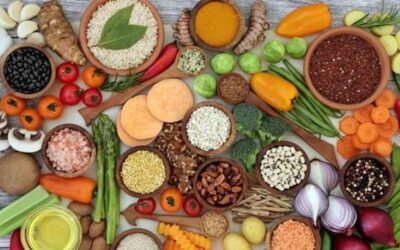Herbal Vinegars

If you talk to a person who is relying on natural products for various problems in health, you will feel as if you are living on a different planet. There is so much around us but we need an eye to see it. There are tons of thousands of species of herbs with different healthy ingredients that we gather from medicines.
Herbs are the leaf parts of the plant. They can be used in cooking as fresh or in a dry form. While herbs are always a favorite in adding flavors to food and dishes, they can be great for health purposes. They can be sweet or savory. You can drink them or have them as an addition to a meal. They are without fat, sugar, or salts. Every herb has its health-promoting factors.
Herbs are usually ones having delicate flavors. If you add them to any meal or drink, you should do it in the last few minutes to get the best aromatic taste or flavor.
Did you know that you can use herbs to make different types of vinegar at home? We will tell you all about this in the article. But before that, let us know more about herbs and how to use them.
Health benefits of herbs

Many herbs have different properties. Even the poisonous ones are essential in some form to our body. Consuming them on regular basis helps a lot in maintaining a good healthy routine. While there are many benefits, we shall discuss some general ones here.
Herbs are great for improving our healthy heart. They also play an important role in the treatment of high-risk diseases such as diabetes and cancer. Many herbs prevent the formation of clots in our bodies, leading to a good blood flow and a healthy heart. The herbs also offer various anti-inflammatory as well as anti-cancer properties.
Some best herb combinations
Various researches have shown that linseed, fenugreek, lemongrass and garlic together can help lower down your blood cholesterol level. The combination of garlic can help control blood pressure to some extent. When you combine fenugreek with other herbs, you can prepare a solution that will help prevent blood sugar. Fenugreek can also control your insulin activity. Some other herbs can do this such as linseed oil, cinnamon and flaxseed.
Another brilliant category of herbs include onions, chives, mint, basil, oregano, sage and leeks. These are great in acting as anti-cancer agents. They naturally treat tumors and are perfectly given in combination with other drugs. Fenugreek can help improve the condition of your hair texture. miraculous herb that is also beneficial for your skin, no wonder that fenugreek is an active ingredient in many herbal cosmetic products. Useful in weight loss.
Almost all herbs are rich in antioxidants. Herbs like cloves; sage, thyme, rosemary, cinnamon and oregano help us by reducing low-density lipoproteins present in our body. This is what we also call the bad cholesterol in our bodies.
Herbs and cooking
If you walk about the use of herbs in cooking, the sky is the limit. There is millions of combination and you can use your kitchen combinations. For the most part, you can use the herbs in cooking with soups, bread, salads, mustards, stews, marinades, cocktails, casseroles, sauces, pickets, desserts, drinks, yogurt, vinegar and vinaigrettes.
Remember that you have the flexibility of when to add the herbs. You don’t need to add them while cooking always. You can add them as the final note after taking the dish out of the heat. Some people even add them before serving as a beautiful green garnish. The visual appearance of herbs surpasses their flavors sometimes. Also, the fragrance of the fresh herbs needs no introduction. For instance, you can use basil leaves as a garnish in the spaghetti or add sage leaves in a chicken dish to enhance the look.
Some great herbs and food combinations
While there are a million ways to combine herbs and food, some more essential ones are as follows:
- Bay leaves can be mixed with poultry, stocks, soups, casseroles and stews.
- The common Indian herb basil goes very well with many dishes. These included tomato soup, potato dishes, chicken, rice, egg, strawberries, meat, prawns, tomato juice, pesto, beverages, etc.
- Chili in fresh and dry form is good with chicken, meat, poultry, curries, shellfish and poultry
- Garlic is good with sauces, meat, shellfish, bread, sauces, pasta and salad dressings
- Ginger is well suited for Asian dishes and biscuits or cakes.
- Coriander is another perfect for Asian dishes. It also goes well with curries, salads, guacamole, soups and stirs fries.
- Fennel is good for beverages, seafood, salads, stuffing, etc.
- Chives are popular with cheese dishes. It also compliments vinaigrettes, mayonnaise, chicken, salads and soups.
- Lemongrass combines well with stir-fries, seafood, soups, tea and a variety of Asian dishes
- Marjoram can be used with pizza, cheese dishes, egg preparations, fish and meat
The list is just the tip of the iceberg. The more herbs you learn about, you will realize more of their importance in food. Always remember that if you wish for good health, save things like creams and butter for occasions. These are best not taken daily.
Vinegar and herb cooking

Vinegar made out of herbs is mostly used in cooking also. But if you are planning to cook with herbs, you need to take care of few essential things. Here are few tips to help you out
- Fresh herbs are mild in flavor while dry ones are very strong. If you follow the general rule, a teaspoon of the dry herb will be equal to four teaspoons of the fresh herb. Hence, judge your measurements accordingly.
- If you have a knack for using herbs on regular basis, a good idea is to create something unique called ‘bouquet Garni. This is done by tying the mixed and chopped herbs in muslin bags and then adding them to flavor your dishes. Make sure that you remove the bags before serving. This method helps to infuse more than one herb and sometimes restrict the flavors while also adding it slowly at the same time.
- Not all herbs are strong and easy to mix in the preparations. Some are harder. Rosemary and parsley are a fine example. These retain their flavor during cooking. To make sure you get the most of these, add them to your cooking at the start of the recipe so that they get enough heat for mixing up nicely.
- Not all herbs are easily eaten. For instance, Bay leaves are not eaten but only used to add flavors.



